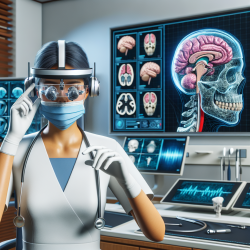Embracing Virtual Reality in Otologic Surgery Training
In the intricate world of otologic surgery, precision and skill are paramount. The complex anatomy of the temporal bone presents a significant challenge for both novice and experienced surgeons. Recent research highlights the potential of virtual reality (VR) simulators in enhancing surgical training, offering a promising avenue for practitioners to refine their skills and reduce the risk of iatrogenic injuries.
The Challenge of Temporal Bone Surgery
Temporal bone surgery requires a deep understanding of the three-dimensional spatial relationships within the ear. The risk of complications, such as facial nerve injury, remains a concern, with rates ranging from 2-6% even in favorable conditions. Traditional training methods, including cadaveric dissections, are invaluable but often limited by availability and accessibility.
Virtual Reality: A Game-Changer in Surgical Training
The VOXEL-MAN TempoSurg® simulator, a state-of-the-art VR tool, offers an innovative solution. This simulator provides a realistic, interactive environment where surgeons can practice temporal bone procedures. It allows for repeated practice without the constraints of cadaver availability, offering a consistent platform for skill development.
Research Findings: Enhanced Skill Development
A study involving 17 ENT physicians and 20 medical students demonstrated the efficacy of VR training. Experienced surgeons completed procedures more quickly and with fewer errors compared to their less experienced counterparts. The simulator's ability to mimic real-life scenarios with haptic feedback and customizable settings makes it an effective training tool.
Implications for Practitioners
For practitioners, integrating VR training into their routine can lead to improved surgical outcomes and reduced complication rates. The simulator not only enhances technical skills but also allows for self-assessment and continuous improvement. As the technology evolves, its role in surgical education is expected to expand, offering more sophisticated and realistic training experiences.
Encouraging Further Research
While the benefits of VR in surgical training are evident, ongoing research is crucial. Future studies should explore the long-term impact of VR training on surgical proficiency and patient outcomes. Additionally, investigating the transferability of skills acquired in a virtual environment to real-life surgeries will further validate the effectiveness of this training modality.
To read the original research paper, please follow this link: Iatrogenic facial nerve injury during otologic surgery.










